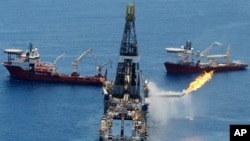Offshore oil drilling crews are closing in on an undersea oil well in an effort to stop a massive oil leak in the Gulf of Mexico. Officials say it could be several more weeks before the well is finally closed off.
Crews on two separate deepwater oil rigs have been drilling for weeks to intercept the well that is leaking crude into the Gulf of Mexico.
Now, BP oil company says one team has drilled far enough to begin using an electromagnetic probe to locate the well some 4,500 meters below the surface of the water. Crews will alternate between drilling and using the sensor to pinpoint the well pipe, which is about 17 centimeters wide.
Coast Guard Admiral Thad Allen, who is overseeing the spill response, said the process will continue for weeks to come.
"They have made the first electromagnetic contact with the well bore," he said. "What they have done now is they are going to drill down several hundred more feet, and they will take another reading. And these sequential readings allow them to slowly close on the well bore."
Earlier this week, Admiral Allen said the operation to drill the so-called relief well is ahead of schedule. But he has not changed the initial estimate that the relief well should be completed no earlier than mid-August.
Experts say drilling a relief well to intersect another well is very difficult, especially in deep waters. Oil crews used the procedure off the coast of Australia last year, when they made four separate efforts before finally hitting the original well. Once the relief well is drilled, crews will pump down mud to stop the flow of oil.
Meanwhile, thousands of vessels are deployed across the Gulf to clean up oil residue from the leak. Admiral Allen says skimmer boats have been vital to cleaning up oil at sea before it hits the coastline.
"In the last two weeks, we have actually increased skimming capacity three-fold and we will continue to do that moving forward," he said.
Officials also are continuing to watch the weather for the possible formation of a tropical storm or hurricane. Bad weather in the Gulf could force officials to halt both drilling and clean-up operations, and prolong the oil leak.




